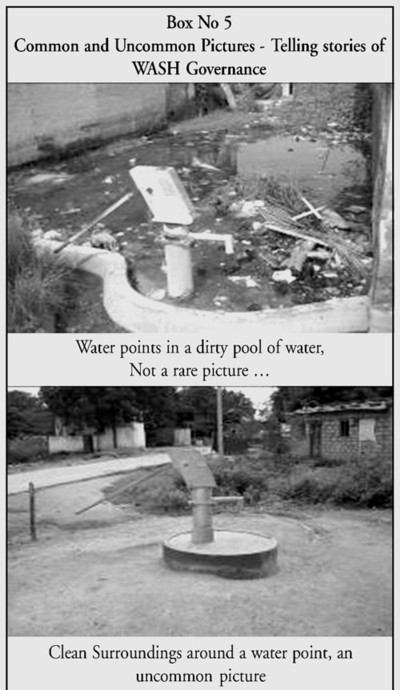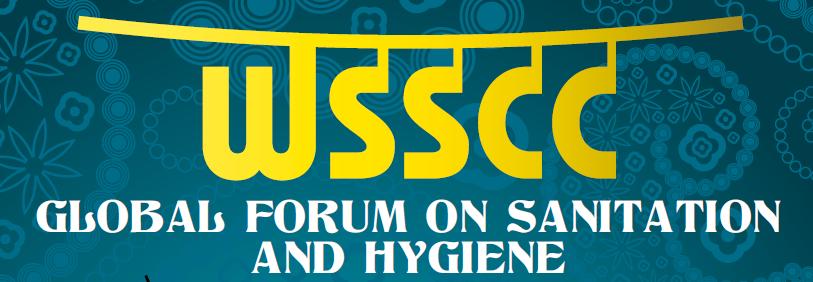/topics/health
Health
People in National capital territory of Delhi are far away from safe drinking water : Role of governance and civil society
Posted on 22 Nov, 2014 10:30 AMThe sanitation crisis in India An urgent need to look beyond toilet provision
Posted on 22 Nov, 2014 10:30 AMGuest post by: Aarti Kelkar-Khambete
Image Courtesy: Wikimedia Commons
The sanitation crisis and the recent evidence on lack of toilet facilities
How valuable are environmental health interventions Evaluation of water and sanitation programmes in India Paper published in the Bulletin of the World Health Organisation
Posted on 22 Nov, 2014 10:30 AMThe paper informs that a number of epidemiological studies on the benefits of water and sanitation interventions have shown that diarrhoea can be reduced by 30–50%.
Understanding governance in WASH sector in Andhra Pradesh A study by WASSAN
Posted on 22 Nov, 2014 10:30 AMProblems in the water, sanitation and hygiene (WASH) sector have their roots in socio-political issues rather than in technology. This paper presents the report of a survey in 107 villages in rural Andhra Pradesh to illustrate the influence of governance systems.

Confessions of an OD boy- The need to achieve a sustainable open defacation free intervention
Posted on 22 Nov, 2014 10:30 AMAuthor: Mohanasundar Radhakrishnan
Hue and cry for drinking water Major struggle for natures call A study by Udayvani and Arghyam
Posted on 22 Nov, 2014 10:30 AMThis study by Udayvani and Arghyam describes the findings of case studies undertaken by Udaywani to get a clear picture of the drinking water and toilet facilities in 8 Gram Panchayats of the 6 Districts of Karnataka following the ASHWAS survey conducted by Arghyam that included a survey of Household Water and Sanitation in 172 Gram Panchayats across 28 districts of Karnataka (all except Bangalore Urban).
Sanitation in India- Progress differentials correlates and challenges: A report by ADB
Posted on 22 Nov, 2014 10:30 AMThis report by Asian Development Bank (ADB) deals with sanitation in India, in particular the progress, differentials, correlates, and challenges. Improved sanitation is essential to reduce ill health, child mortality, lost income associated with morbidity, and to improve environment, human dignity, and quality of life. Goal 7, target 3 of the Millennium Development Goals (MDGs) stipulates decreasing the proportion of population without sustainable access to basic sanitation by 50 per cent in the year 2015.
Live feed WSSCC Global Forum on Sanitation Hygiene 914 October 2011 Mumbai
Posted on 22 Nov, 2014 10:30 AM
We all know the statistics: 2.6 billion people around the world are without access to a basic toilet. Diarrhoea – the vast majority of it due to poor sanitation and hygiene – is the second biggest killer of children worldwide.
Between us, we also have many of the answers. We have experiences of low-cost technologies that are acceptable and affordable for poor communities in rural areas. We have been involved in designing communications programmes that have contributed to sustained behaviour change.
We have seen governments and civil society working together to set up policies and programmes that ensure access to better sanitation in challenging settings, such as crowded informal settlements in fast-growing megacities. We have also seen businesses grow up around sanitation and hygiene, allowing individuals to make a dignified living and clients to buy the sorts of products and services they want and need.
Women and water: A collection of papers Economic and Political Weekly Volume XLVI Number 18 April 30 2011
Posted on 22 Nov, 2014 10:30 AMIt does this in the context of the new decentralised governance structures that are based on the assumption that domestic water supply is the legitimate domain of women and thus power and authority needs to be granted to women to manage water resources.
However, there is a very little understanding of how this has benefited women and what are the challenges experienced during the process of implementation or the outcomes gained from these processes, in the context of the Indian society that continues to propogate patriarchal values and is based on structures that are inherently hierarchical and inequitable.
Some of the papers dwell on and explore the inherent biases in the literature and make an attempt to understand their implications for women in managing water resources, while some of the papers share case studies on the outcomes of the implementation of the decentralised water management policies at the village level.





